Recovering addicts often face significant challenges in managing their health, with dental issues being a prevalent concern.
Substance abuse can lead to severe dental problems, and the cost of treatment, particularly dental implants, is usually high.
Fortunately, free dental grants for recovering addicts offer a solution. These grants, provided by various organizations, government agencies, dental schools, and charities, aim to alleviate the financial burden associated with dental care.
They cover essential treatments, including expensive procedures like dental implants, that many recovering addicts would otherwise be unable to afford.
These grants are a critical step towards helping individuals in recovery regain not only their dental health but also their confidence and quality of life.
Read More: Blu M8l Tablet Free Government
Is It Possible for Recovering Addicts to Obtain Free Dental Implants?
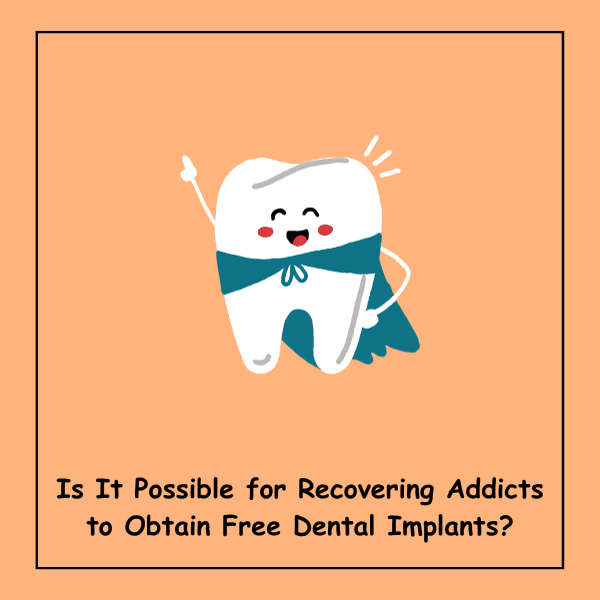
Yes, it is indeed possible for recovering addicts to obtain free dental implants. More than 75% of individuals in recovery from substance abuse suffer from dental problems, which are often aggravated by a lack of funds for necessary treatment.
Recognizing this need, several organizations offer dental grants specifically designed for recovering addicts. These grants are accessible globally and provide significant relief by covering partial or full costs of dental implants.
The process of obtaining these grants involves applying through the respective organizations, which may include undergoing dental health screenings and providing documentation of addiction recovery status and financial need.
Programs by dental schools, research institutions, and charities often offer free or low-cost dental care, including implants, as part of their commitment to supporting individuals in recovery and improving their overall well-being.
Read More: Free Ipad with Medicaid
How Dental Grants for Recovering Addicts Work?
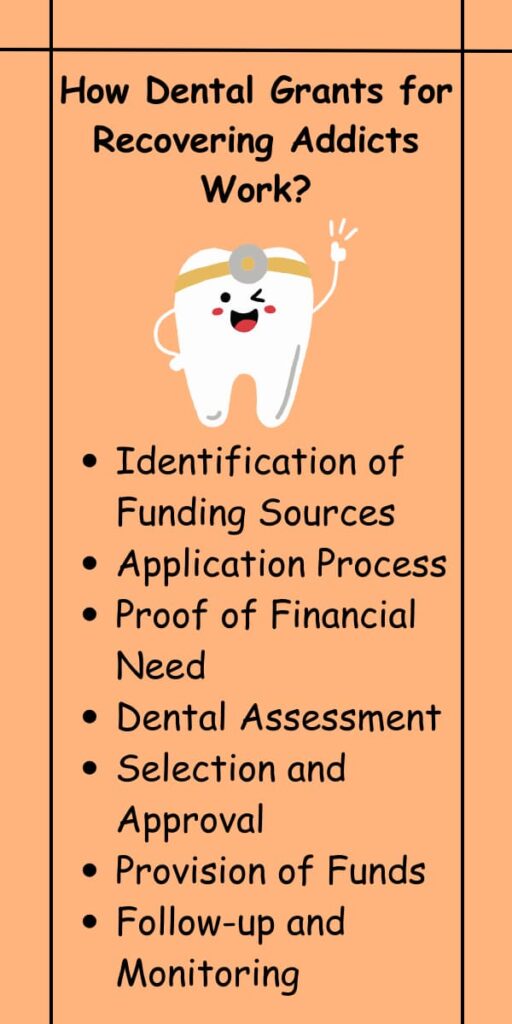
Dental grants for recovering addicts are specialized financial assistance programs aimed at providing necessary dental care to individuals recovering from substance abuse.
Understanding the detrimental impact of drugs and alcohol on oral health, these grants are designed to address a wide range of dental issues commonly faced by recovering addicts, including tooth decay, gum disease, and tooth loss.
The functioning of these grants involves several key steps:
- Identification of Funding Sources: The grants are typically funded by a variety of sources such as government health departments, private foundations, dental schools, and non-profit organizations dedicated to health and recovery.
- Application Process: Recovering addicts seeking dental grants must go through an application process, which typically involves completing detailed forms. These forms require personal information, dental health status, history of substance abuse, and evidence of recovery efforts.
- Proof of Financial Need: Applicants must demonstrate a lack of financial resources to afford dental care. This could include providing income statements, employment status, or other financial documents.
- Dental Assessment: Some programs require a dental examination by a qualified dentist to assess the extent of dental damage and to determine the most appropriate treatment plan, including the necessity for dental implants.
- Selection and Approval: Applications are reviewed by a committee or board, which selects recipients based on predefined criteria, including the severity of dental issues, the recovery status of the applicant, and financial need.
- Provision of Funds: Once approved, funds are either disbursed directly to the dental service providers or are allocated to the recipients in a way that ensures the grants are used specifically for dental treatment purposes.
- Follow-up and Monitoring: Many programs also include follow-up procedures to monitor the effectiveness of the treatment and the impact on the overall health and recovery process of the individual.
Read More: Ashley Furniture Free Bed Assistance Program
How Do You Apply for Dental Implants for Recovering Addicts?
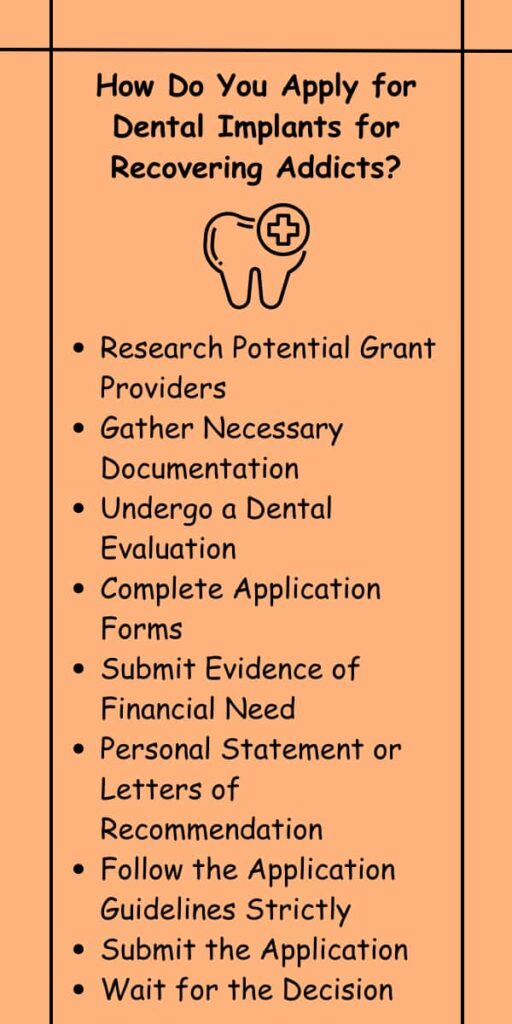
Applying for dental implants as a recovering addict involves a multi-faceted approach:
- Research Potential Grant Providers: The first step is identifying organizations and programs that offer dental grants for recovering addicts. This can be done through online research, consultations with dental clinics, or by contacting addiction recovery support groups.
- Gather Necessary Documentation: Applicants typically need to compile various documents including proof of recovery program participation, financial records indicating income level, and personal identification documents.
- Undergo a Dental Evaluation: A key part of the application is a dental assessment. This may involve visiting a dentist who will examine the applicant’s dental health and provide a professional opinion on the necessity and scope of dental implants required.
- Complete Application Forms: Filling out detailed application forms is crucial. These forms generally ask for personal information, dental health history, details about substance abuse history, and information about the recovery process.
- Submit Evidence of Financial Need: Applicants need to demonstrate that they cannot afford dental care independently. This may include submitting tax returns, pay stubs, or other evidence of financial hardship.
- Personal Statement or Letters of Recommendation: Some grants may require a personal statement from the applicant explaining their journey of recovery and the importance of dental care in this process. Letters of recommendation from healthcare providers or counselors can also strengthen the application.
- Follow the Application Guidelines Strictly: It’s important to carefully read and follow the application guidelines provided by the grant-issuing organization. This ensures that all necessary information is included and increases the chances of a successful application.
- Submit the Application: After completing all the steps, the final application along with all the required documents should be submitted before the deadline.
- Wait for the Decision: After submission, there will be a review period during which the application is evaluated. Applicants are typically notified about the decision through email or mail.
Read More: Free Government Grants for Dental Implants
Are Dental Implants for Recovering Addicts Expensive?
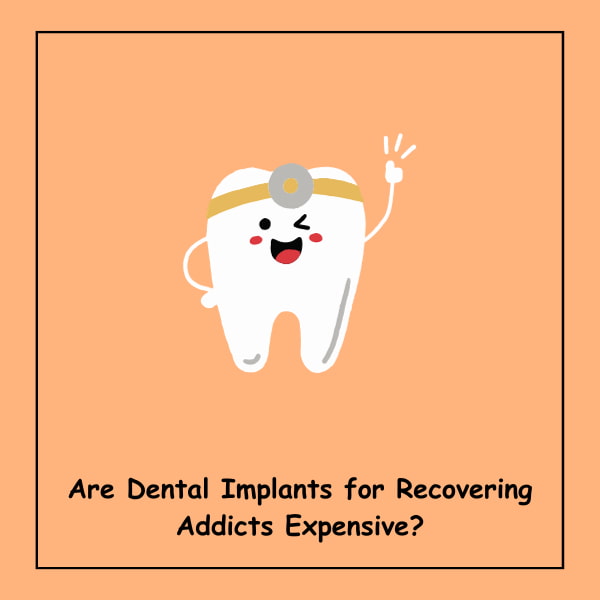
Dental implants for recovering addicts are typically associated with high costs. This is due to the complexity of the implant procedure, the need for skilled dental professionals, and the use of high-quality materials.
The expense can be a significant barrier for many recovering addicts, who often struggle with financial constraints due to their past substance abuse.
The cost of dental implants varies, but it can range from $3,000 to $5,000 for a single tooth, making it a substantial financial commitment.
These costs can increase depending on various factors, including the number of implants needed, the health of the jawbone, and the geographical location of the dental practice.
For recovering addicts who may have already exhausted their resources, these costs can be prohibitively high, emphasizing the need for financial assistance.
Read More: How to Get Free Cleaning Supplies
Ways to Receive Free Dental Grants for Recovering Addicts
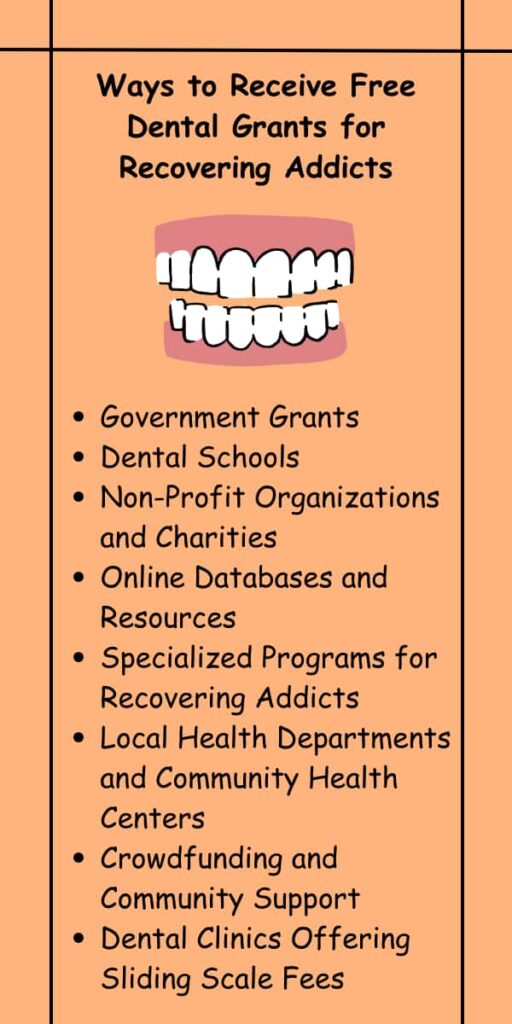
Recovering addicts have several avenues to explore when seeking free dental grants for dental implants and other necessary dental procedures:
- Government Grants: Some government-funded programs offer grants specifically for low-income individuals, including recovering addicts. These grants can be used for various dental procedures, including implants. Recovering addicts can search for these opportunities on government websites like Grants.gov.
- Dental Schools: Many dental schools provide reduced-cost dental services as part of their training programs. These institutions often have grant programs or special arrangements for individuals in recovery, offering a more affordable route to necessary dental care.
- Non-Profit Organizations and Charities: Several non-profit organizations and charities focus on providing dental care to underserved populations, including recovering addicts. These entities sometimes offer grants or free dental services, including implants, as part of their mission to improve community health.
- Online Databases and Resources: Websites like NeedyMeds offer databases of clinics and dental providers that offer discounted services. Recovering addicts can use these resources to find affordable dental care options in their area.
- Specialized Programs for Recovering Addicts: Some dental care programs are specifically designed to assist individuals recovering from substance abuse. These programs understand the unique challenges faced by recovering addicts and provide grants or free services to help meet their dental needs.
- Local Health Departments and Community Health Centers: Local health departments and community health centers often have information on available dental grants and free or low-cost dental care programs suitable for recovering addicts.
- Crowdfunding and Community Support: In some cases, recovering addicts might turn to crowdfunding platforms to raise funds for dental implants. Local community groups or religious organizations may also offer support or have information on available resources.
- Dental Clinics Offering Sliding Scale Fees: Some dental clinics offer services on a sliding scale based on income. Recovering addicts with limited financial means can access dental care at a more affordable rate through these clinics.
Read More: Free Gas Cards for Homeless
The Procedure to Get Dental Grants
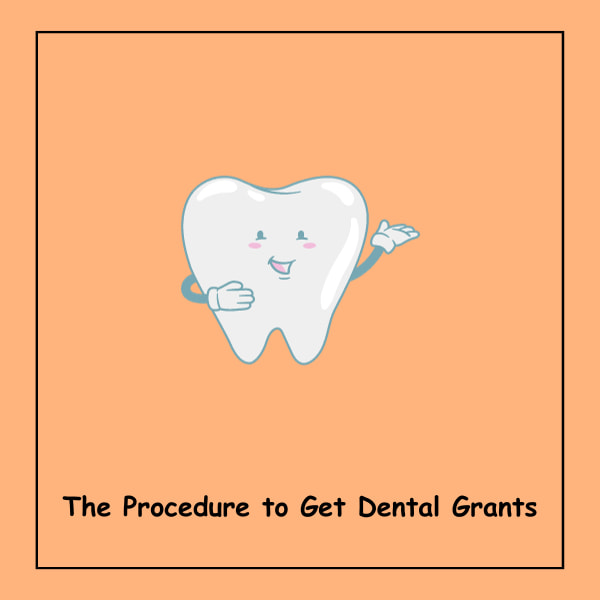
Obtaining dental grants for recovering addicts involves a comprehensive procedure that ensures the right assistance reaches those in need.
Initially, individuals seeking dental help must embark on a thorough search for available opportunities.
This search can encompass various sources such as government grants for recovering addicts, non-profit organizations specializing in dental care, and foundations committed to aiding individuals in recovery.
The essence of this step lies in identifying grants that align with the specific needs and eligibility criteria of recovering addicts.
Once potential grant sources are identified, the next crucial phase is the application process.
This stage requires meticulous attention to detail, as applicants must fill out forms providing personal information, details about their dental health, and a background of their substance abuse history.
The applications typically probe into the applicants’ dental health requirements, ensuring that the grants are allocated to those who genuinely need them for dental treatment.
A pivotal part of securing these grants is demonstrating financial need. Recovering addicts are often required to provide proof of their financial status, showcasing their inability to afford dental treatment.
This documentation may include income statements, employment status, or other evidence indicating financial constraints.
It’s a critical step to ensure that the grants are awarded to individuals who lack the means to fund their dental care.
In certain cases, a professional dental assessment may be necessitated to evaluate the extent of the individual’s dental issues.
This assessment aims to establish a clear understanding of the dental treatment required, be it dental implants or other procedures.
Such evaluations are instrumental in determining the urgency and type of dental care needed, which in turn influences the grant allocation.
The final step in the procedure is the review and approval of the application by the grant-providing organization.
This phase involves a careful examination of all submitted documents and assessments to make informed decisions about grant allocations.
Successful applicants are then notified, and arrangements are made to disburse the grants.
These grants play a significant role in facilitating essential dental treatments for recovering addicts, aiding significantly in their journey towards full recovery and improved quality of life.
Read More: Government Grants for Free Dentures
Grants from the School of Dentistry
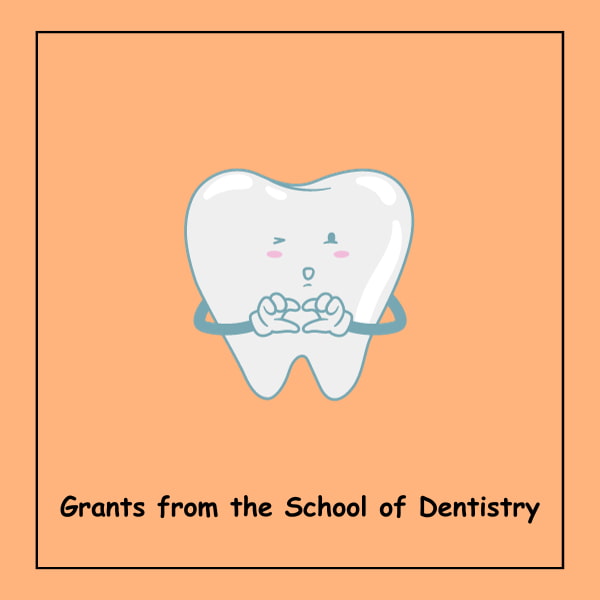
Grants from the School of Dentistry are another crucial avenue for recovering addicts to receive dental care.
These grants are often part of the educational institutions’ initiatives to provide practical experience to dental students while offering affordable dental care to the community.
Dental schools across the country have programs that cater specifically to recovering addicts, acknowledging the significant impact of substance abuse on oral health.
These institutions typically offer a range of dental services, from basic care to more complex procedures like dental implants.
The treatments are provided by dental students under the supervision of experienced dental professionals, ensuring a high standard of care.
For recovering addicts, this presents an opportunity not only to receive dental treatment at a reduced cost but also to contribute to the education of future dentists.
The process to access these grants usually involves contacting the dental school directly to inquire about their specific programs for recovering addicts.
Interested individuals can discuss their dental needs and financial situation with the school’s representatives to understand the kind of support available.
While not all dental schools may offer completely free services, many provide treatments at significantly reduced costs, making essential dental care more accessible for those in recovery.
Read More: Government Car Voucher Program
Receive Dental Grants for Recovering Addicts
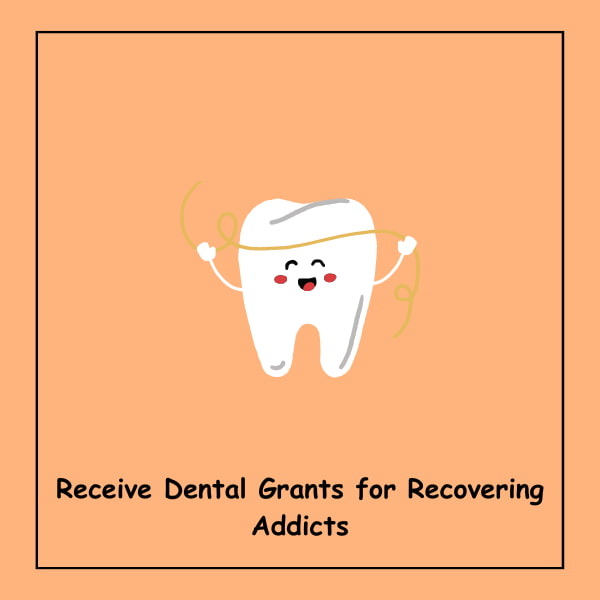
Dental grants for recovering addicts offer crucial assistance to individuals seeking to rebuild their lives after overcoming substance abuse.
These grants, often provided through government grants for recovering addicts or private foundations, aim to alleviate the financial burden of dental care.
For many recovering addicts, the cost of dental treatment can be a significant barrier to achieving complete health.
To access these grants, applicants are required to demonstrate their commitment to recovery, typically with documentation from addiction treatment programs or healthcare providers.
Furthermore, proving financial hardship is an essential criterion, as these grants are designed to help those who cannot afford dental care.
The process often includes a comprehensive dental health assessment to determine the most urgent needs and appropriate treatments, ensuring the funds are utilized effectively.
Read More: Free Electronics from the Government
Are There Any Free Dental Implants for Recovering Addicts Available?
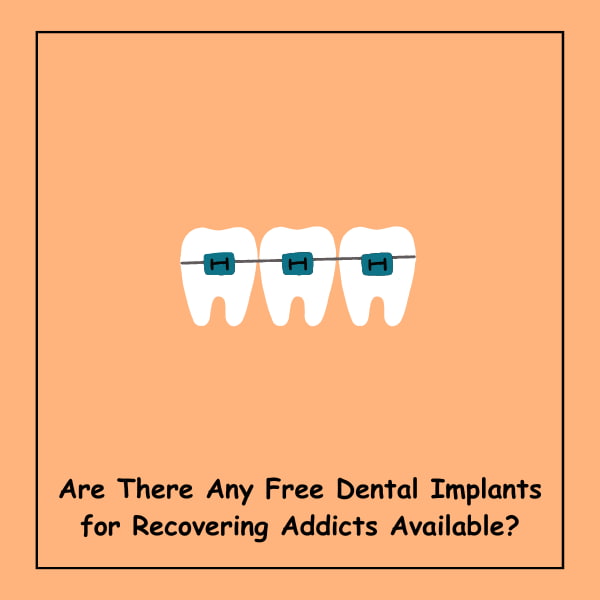
Indeed, there are programs that offer free dental implants for recovering addicts.
These initiatives are crucial for individuals who have undergone substance abuse and are in dire need of dental restoration but cannot afford the high costs associated with dental implants.
Accessing these free dental implants typically involves an application process where the individuals have to prove their financial incapacity and commitment to ongoing recovery.
While these programs are not widely available, they are vital in restoring not only the dental health but also the confidence and overall well-being of recovering addicts.
Read More: Pell Grant for Yoga Teacher Training
Issues Faced by Recovering Addicts
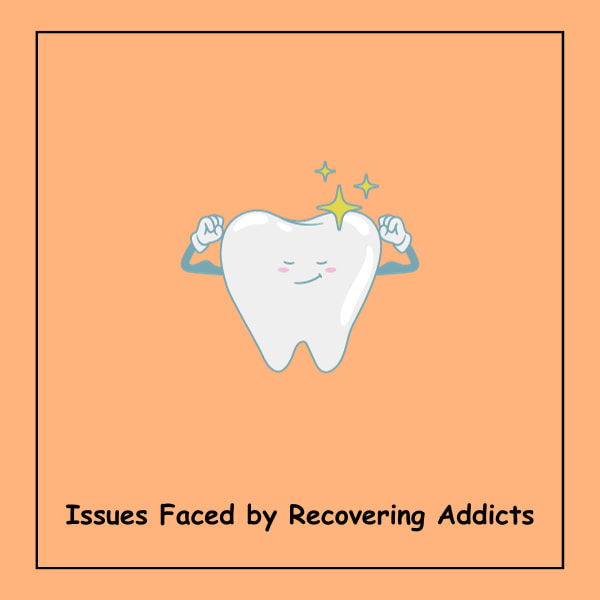
Recovering addicts often struggle with a range of dental issues due to the damaging effects of substance abuse.
These problems can include severe tooth decay, gum disease, and tooth loss, leading to the need for comprehensive dental treatment for drug addicts.
If left untreated, these dental issues can lead to significant pain, infection, and further health complications.
Moreover, the psychological impact of poor dental health, such as reduced self-esteem, can also hinder the recovery process.
Thus, dental care for recovering addicts near me becomes crucial in ensuring these individuals receive the necessary treatment.
Read More: How to Get a Free Android Tablet
Bad Effects of Missing Teeth
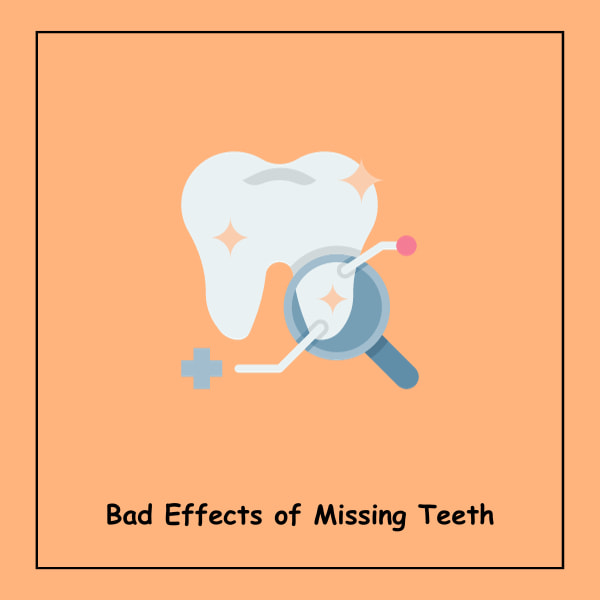
The bad effects of missing teeth are far-reaching, impacting not only the physical but also the emotional well-being of an individual.
When teeth are lost, especially among recovering addicts who might have experienced tooth loss due to substance abuse, it leads to several dental and health issues.
The adjacent teeth may shift into the empty spaces, affecting the bite and leading to further oral health problems.
Jawbone deterioration is another significant concern, as the absence of tooth roots leads to the loss of bone mass in the jaw.
This can alter the shape of the face, leading to aesthetic concerns that might affect an individual’s self-esteem and confidence.
Moreover, missing teeth compromise the ability to chew food properly, which can lead to nutritional deficiencies. In the context of dental care for recovering addicts near me, addressing tooth loss is crucial for overall health and well-being.
Read More: Free Shoes for Low-Income Families
Is Dental Implant for Recovering Addicts Expensive?
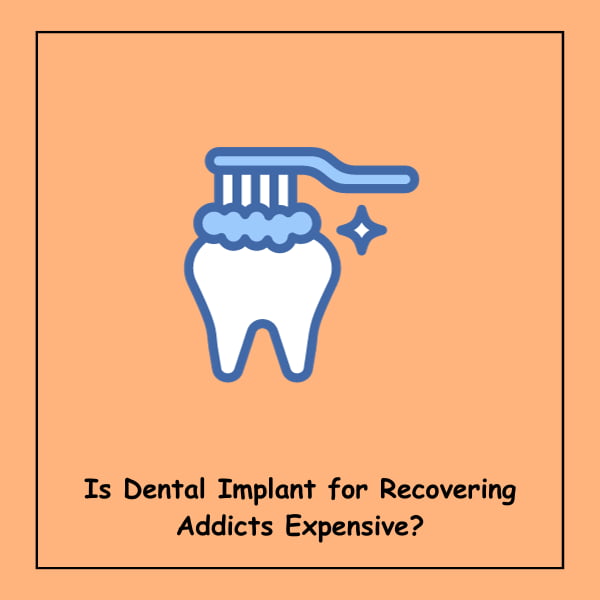
The question of whether dental implants for recovering addicts are expensive is a pertinent one. Generally, dental implants can be quite costly, primarily due to the materials used and the complexity of the procedure.
For recovering addicts, who might already be facing financial challenges, the high cost of dental implants can be a significant barrier to accessing this essential dental treatment.
Dental implants are a preferred solution for missing teeth due to their durability and functionality, but their high cost can make them inaccessible for many recovering addicts without financial assistance.
Read More: Computer with an ACP Laptop
Free Dental Implants for Recovering Addicts
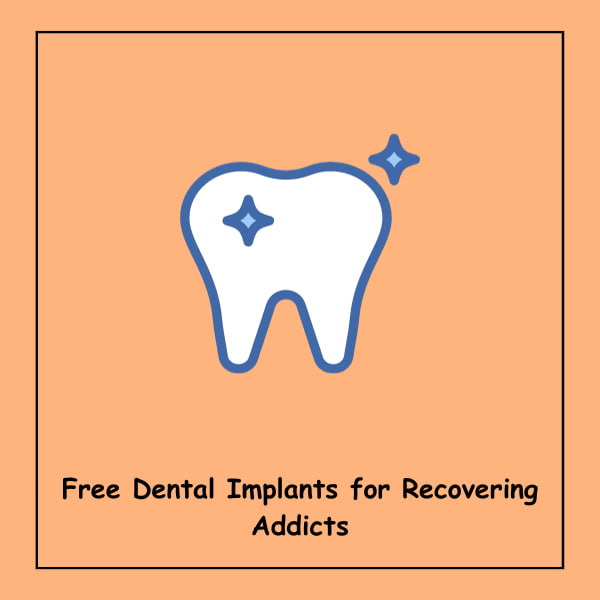
Fortunately, there are programs that offer free dental implants for recovering addicts. These programs are designed to provide essential dental care to individuals in recovery who cannot afford such treatments.
They recognize the crucial role of good dental health in the overall recovery and rehabilitation process.
Accessing these free dental implants typically involves applying through specific programs or foundations dedicated to helping recovering addicts.
These initiatives often collaborate with dental professionals and organizations willing to support individuals in recovery by providing free or reduced-cost dental care.
Read More: AirTalk Wireless Free iPhone
Financial Assistance for Recovering Addict with Free Dental Implants
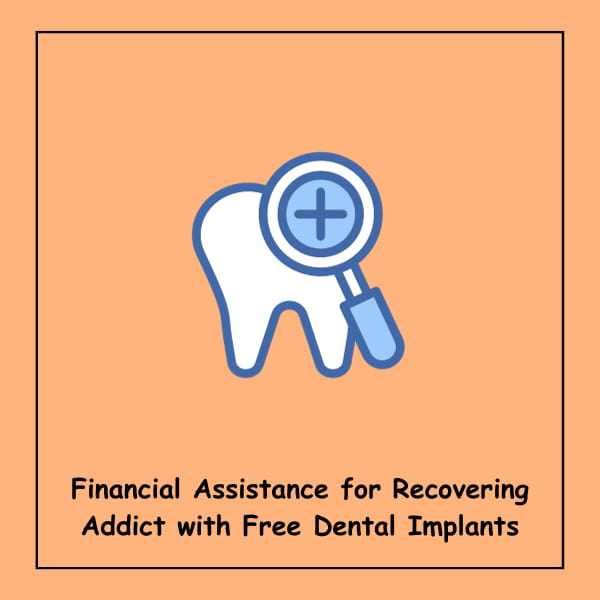
Financial assistance for recovering addicts with free dental implants is an essential aspect of the support system for those in recovery.
Various organizations, including government grants for recovering addicts and private foundations, offer financial aid to cover the cost of dental implants.
This assistance is vital in making dental care accessible and affordable for recovering addicts. The application process for these grants might require documentation of both the recovery process and the financial need.
By offering dental grants for recovering addicts and facilitating access to free dental implants, these programs play a pivotal role in ensuring that recovering addicts receive the comprehensive care they need, contributing significantly to their journey towards a healthier, substance-free life.
Read More: Free Government Phone Program
Oral Health Issues of Recovering Addicts
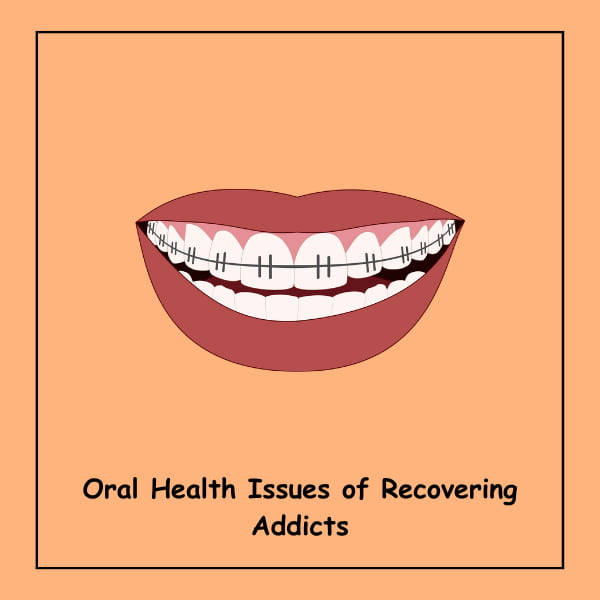
Recovering addicts often face a myriad of oral health challenges, a direct consequence of substance abuse. These issues can include severe tooth decay, gum disease, and tooth loss.
Substance abuse, particularly involving drugs like methamphetamine and heroin, can exacerbate these problems, leading to what’s commonly known as “meth mouth,” characterized by rampant tooth decay and gum disease.
Furthermore, habits like neglecting oral hygiene during periods of substance use worsen these conditions. Addressing these oral health issues is crucial for the overall well-being and successful rehabilitation of recovering addicts.
Access to dental treatment for drug addicts and dental care for recovering addicts near me becomes a critical component of their recovery journey.
Other Assistance with Free Dental Implants for Recovering Addicts
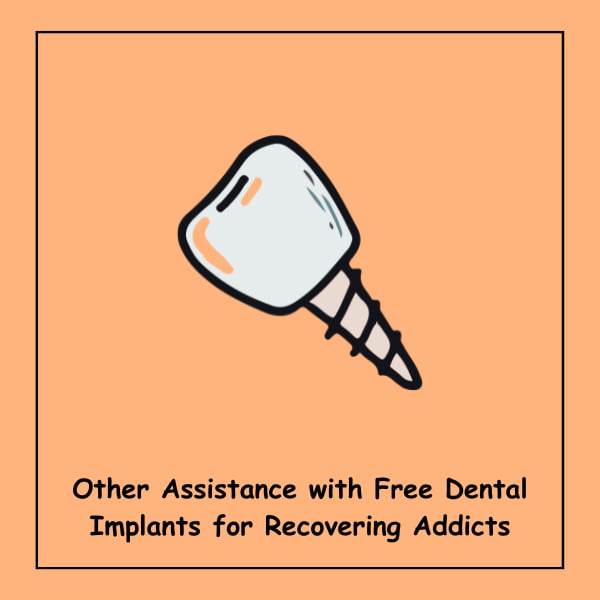
For many recovering addicts, the high cost of dental implants can be a significant barrier to restoring their oral health.
Fortunately, there are programs offering free dental implants for recovering addicts, providing essential support to those in need.
These programs often involve collaborations with dental professionals and organizations willing to offer their services at reduced costs or even for free.
They aim to address the severe dental issues faced by recovering addicts, helping them regain not only their oral health but also their confidence and overall quality of life.
Accessing these programs typically involves a detailed application process, where the individuals must demonstrate their recovery status and financial need.
Read More: Free iPads with EBT
Become a Part of the Addiction Recovery Grant Program
For those looking to support recovering addicts, becoming a part of the addiction recovery grant program can be an impactful endeavor.
These programs, often funded by government grants for recovering addicts or private foundations, provide financial assistance for various rehabilitation needs, including dental care.
Participating in these programs, either as a beneficiary or a contributor, can make a significant difference in the lives of recovering addicts.
Grants for recovering addicts play a vital role in offering a comprehensive recovery approach, addressing not just the addiction but also the associated health issues, including dental problems.
Conclusion
In conclusion, while dental care, particularly dental implants, can be prohibitively expensive for recovering addicts, a range of programs and initiatives offers hope. Free dental implants for recovering addicts,
Most Searching Posts:
- Free Government Iphone 8
- Free Government Smartwatch
- Safelink Free Tablet
- Free Laptop for Veterans
- Free Government Phone
- Free Mobility Scooter
- Free Roofing for Seniors
- Free Medicaid Tablet
- I Want Free Laptop from Google
- Car Vouchers for Single Mothers
- Free Refrigerator Program Cleveland Ohio
- T-Mobile Free Tablet EBT
Frequently Asked Questions (FAQ):
What Are Dental Grants for Recovering Addicts?
Dental grants for recovering addicts are specialized financial aid programs designed to assist individuals in recovery from substance abuse by providing financial assistance for essential dental care, including procedures like dental implants.
Who Is Eligible to Apply for Dental Grants for Recovering Addicts?
Eligibility criteria may vary among different grant programs, but typically, individuals in recovery from substance abuse who demonstrate financial need and a commitment to their recovery process are eligible to apply.
What Dental Procedures Do These Grants Cover?
Dental grants for recovering addicts often cover a wide range of dental procedures, including but not limited to tooth extractions, fillings, root canals, dental implants, and other treatments essential for restoring oral health.
How Can Recovering Addicts Apply for These Dental Grants?
The application process generally involves filling out detailed forms provided by the grant-issuing organizations. Applicants may need to provide personal information, details about their dental health, history of substance abuse, proof of recovery efforts, and evidence of financial need.
Are Dental Implants Expensive for Recovering Addicts?
Dental implants can be costly, ranging from several thousand dollars for a single tooth. For many recovering addicts facing financial constraints due to past substance abuse, the cost can be prohibitive. However, dental grants aim to alleviate this financial burden by providing assistance for such expensive procedures.
Where Can Recovering Addicts Find These Dental Grants?
Dental grants for recovering addicts are available through various sources such as government-funded programs, dental schools, non-profit organizations, charities, online databases, specialized programs for recovering addicts, local health departments, community health centers, and crowdfunding platforms.
What Documents Are Required to Apply for Dental Grants?
Necessary documentation may include proof of participation in recovery programs, financial records indicating income levels, personal identification documents, dental health history, substance abuse history, and evidence showcasing financial hardship.
Are There Programs Specifically Designed for Dental Care for Recovering Addicts?
Yes, there are specialized programs offered by dental schools, non-profit organizations, and healthcare institutions that focus on providing dental care tailored to the needs of recovering addicts, often at reduced or no cost.
How Do Free Dental Implants Benefit Recovering Addicts?
Free dental implants contribute significantly to restoring not only the oral health but also the confidence and overall well-being of recovering addicts. These programs play a vital role in facilitating a smoother recovery journey.
Can Individuals Contribute to Supporting Recovering Addicts’ Dental Care?
Yes, individuals can support recovering addicts’ dental care by participating in or contributing to addiction recovery grant programs, volunteering with non-profit organizations, or supporting initiatives that offer financial assistance for dental treatment.




